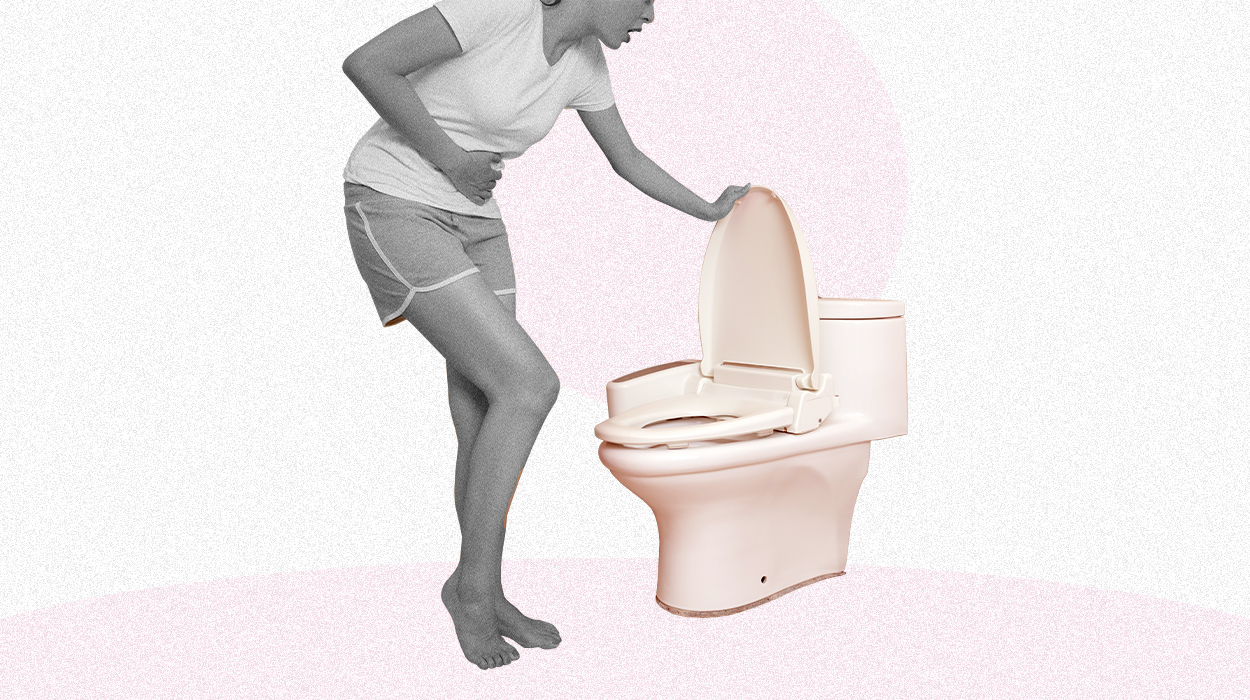 Evidence Based
Evidence Based
Evidence Based
This article is objectively based on relevant scientific literature, written by experienced medical writers, and fact-checked by a team of degreed medical experts.
Our team of registered dietitian nutritionists and licensed medical professionals seek to remain objective and unbiased while preserving the integrity of any scientific debate.
The articles contain evidence-based references from approved scientific sites. The numbers* in parentheses (*1,2,3) will take you to clickable links to our reputable sources.
Is Bowel Leakage A Sign Of Cancer? Bowel Leakage Causes & Treatments In 2024

If you have been struggling with fecal incontinence, you may ask: “Is bowel leakage a sign of cancer?” Accidental leakage can be surprising and concerning, not to mention embarrassing. Many people who struggle to control bowel movements are ashamed to seek help. Still, your doctor needs to know if you are experiencing bowel leakage or any changes in your bowel habits, which may indicate a risk of colorectal cancer.
A lot is already known about the symptoms and causes of bowel leakage; however, researchers are still actively studying the best ways to treat bowel leakage. In fecal incontinence, the effects of gut health, the usefulness of probiotics as treatment, and barriers to seeking care are currently popular research topics.
Is Bowel Leakage A Sign Of Cancer?
Yes, bowel leakage could be a sign of cancer, but it is more likely a sign of another issue. Other symptoms like rectal bleeding or the inability to have a bowel movement can also be signs of cancer. If you have a gastrointestinal disorder, then you are more likely to experience bowel leakage or other issues in your bowel habits.
The Connection Between Bowel Leakage & Cancer
If you recently experienced bowel leakage, you may be worrying, “Is the loss of bowel control a sign of rectal cancer or other cancers?” or, “Do I need to see a colon and rectal surgeon for rectal surgery?”
Yes, bowel leakage is related to gastrointestinal cancers like colon and rectal cancers and lymphoma. However, while fecal incontinence could be a cancer symptom, it can also be caused by many other things. It’s best to report any changes so you can rule out dangerous things for your peace of mind.
The risk of your having cancer if you have fecal incontinence, is not zero, but it is low.[1] Of the anal cancer symptoms, bleeding from the rectum is the most worrisome. Thus, urgency, frequent need to have a bowel movement, inability to do so, and mucus drainage from the rectum are less indicative signs.
Anastomotic leakage,[2] in which there is a separation of parts of the colon that has been put back together surgically, is quite different. This only occurs after colon surgery, usually to remove cancerous growths or obstructions. As such, a concern may be related to cancer; it requires hospitalization.
Featured Partner

Low-Calorie
Non-GMO
Vegan-friendly
Get Blown Away By Expert-Crafted Formula
Learn More About Colon Broom – one of the quality supplements promoting regular bowel movements, alleviates bloating, and supports healthy cholesterol levels.
What Is Bowel Leakage?
Normally, the internal and external anal sphincters’ anatomy[3] and function prevent accidents. The internal sphincter is under autonomic control. The external sphincter is a voluntary muscle. Bowel leakage, also called bowel incontinence or fecal incontinence, is unexpected and unintended leakage of stool.
It occurs when the anal sphincters are not working properly. Bowel leakage can occur with liquid stool or solid stool. The inability to keep the stool from being released unintentionally is the defining characteristic of bowel leakage, not the consistency of the stool itself. This highlights the importance of the integrity of the sphincters.
To be diagnosed[4] with fecal incontinence, you must have leakage two times or more in four weeks. The criteria became more stringent in 2016 because some doctors and researchers disagreed[5] with the original criteria. It is apparent that patients with less frequent fecal incontinence also report lower quality of life.
Bowel Leakage Symptoms
Fecal incompetence is often considered a symptom[6] of another issue rather than a disorder — or official diagnosis. Bowel leakage leads to[7] a lower quality of life, psychological distress, and reduced productivity.
Patients may be concerned about leaving the house out of fear of experiencing incontinence in public. Since fecal incontinence irritates the skin, patients can experience rashes or other discomfort due to fecal incontinence. Additionally, the cost of incontinence supplies can be burdensome. This is why discussing your symptoms with your doctor is so important.
What Are The Causes Of Bowel Leakage?
Researchers often describe risk factors for bowel leakage rather than causes. This is because it is nearly impossible to determine the exact cause of any symptom. Instead, researchers study what traits are often associated with, or which may put you at risk for, bowel leakage.
Researchers categorize potential causes of bowel leakage into four categories: physical abnormalities, functional disorders, neurological disorders, and congenital disorders.
Physical Abnormalities
Some physical abnormalities that could lead to bowel leakage include[6] having completed a vaginal delivery, having undergone surgery, having the presence of rectal prolapse, or having trauma to the area.
Doctors[8] and researchers[9] often suspect that women are more likely to experience fecal incontinence because of factors related to childbearing. However, this is not necessarily supported by research.
Functional Disorders
Functional disorders that could lead to bowel leakage include[6] chronic diarrhea, irritable bowel disease, tumors from rectal cancer, inflammatory bowel disease, malabsorption, fecal impaction, physical disabilities, and psychiatric disorders.
Just over 43%[10] of US patients with IBS reported experiencing fecal incontinence, and almost 20% reported frequent incontinence. Participants over 40 were more likely to report experiencing fecal incontinence. Additional risk factors for fecal incontinence in US patients with IBS included urgency and loose, frequent stools.
Neurological Disorders
Neurological disorders that could lead to bowel leakage include[6] pudendal neuropathy, spinal surgery, multiple sclerosis, dementia, central nervous system disorders, and spina bifida.
Congenital Disorders
Congenital disorders that could lead to bowel leakage include[6] cloacal defects[11] and neurological dysfunction caused by the anatomical distortion of spina bifida.[12] Another congenital problem is an imperforate, or closed, anus which has the opposite problem – nothing can pass.
What Should You Do If Your Bowel Is Leaking?
Consult Your Doctor
If your bowel is leaking, you should make an appointment to discuss the issue with your doctor. Many people are embarrassed to bring up this issue with the doctor, but the truth is your doctor wants to know as part of providing adequate care for you.
Researchers note that although 75%[8] of primary care doctors screen for urinary incontinence, only 35% screen for fecal incontinence. Since primary care doctors screen for fecal incontinence less frequently, you may need to initiate this conversation with your doctor.
By reading this article, you have already taken the first step in seeking medical care: learning about the condition! A lack of knowledge about bowel incontinence is one of the main reasons women do not seek treatment. Women also report that they don’t report their symptoms to their doctor because they think bowel leakage is a normal part of aging.
Interestingly, although there were no differences in the amount of stool leakage between men and women, men[9] were more likely to report fecal incontinence sooner. This could be because they are more comfortable talking about it.
Improve Your Gut Health
One thing you can do if your bowel is leaking is try to heal your gut. You can try incorporating more gut-healing foods into your diet or ask your doctor about a colon cleanse. Eating probiotic foods, foods low in fermentable carbohydrates, and superfoods could also help you improve your gut health.
Researchers are studying the effects of gut health on fecal incontinence. Specifically, studies show that altering your diet and including probiotics in your diet may reduce symptoms[13] of irritable bowel syndrome that result in fecal incontinence. And diets low in fermentable oligosaccharides, disaccharides, monosaccharides, and polyols, or the FODMAP diet may also help.
Taking digestive enzymes may also help prevent bowel leakage if it is a symptom of another disorder. For example, digestive enzyme supplementation may help relieve[14] gastrointestinal disorders such as food intolerances or inflammatory bowel disease symptoms.
The Bottom Line
If you’ve been wondering, “Is bowel incontinence a sign of cancer?” then you have your answer! While bowel incontinence can be a sign of cancer, it is more likely a sign of something else, like a physical abnormality, functional gastrointestinal disorder, or neurological disorder. While these aren’t deadly, your quality of life is very important.
If you are experiencing bowel incontinence or any significant change in your normal bowel movements, you should make an appointment with a healthcare provider. Although it can be uncomfortable, the only way to begin getting relief is to discuss your symptoms with your doctor.
Improving your digestive health by evaluating your diet may also be a good thing to try.
Frequently Asked Questions
Fecal incontinence is not directly related to bowel cancer; however, surgery or tumors related to bowel cancer could cause fecal incontinence.
Bowel leakage is more common than you might think because it is underreported, as many people are uncomfortable talking about the topic. That being said, bowel leakage is still unusual and never considered normal. If you are experiencing it, you should seek treatment.
The sentinel symptom of bowel cancer is bleeding. However, a change in your bowel habits[15] is also significant and should not be ignored. If your stool is a different consistency or the frequency of your bowel movements has changed significantly, it may warrant consulting your doctor.
Colon cancer can occur in people of all ages; however, the risk increases as you age. That is why regular colonoscopies are recommended over the age of 50.
Frequent diarrhea could be a sign of cancer if it is a big change from your normal bowel movements and you are not experiencing another issue like food poisoning, bowel disease, or irritable syndromes.
+ 15 sources
Health Canal avoids using tertiary references. We have strict sourcing guidelines and rely on peer-reviewed studies, academic researches from medical associations and institutions. To ensure the accuracy of articles in Health Canal, you can read more about the editorial process here
- Kasper Adelborg, Veres, K., Jens Sundbøll, Gregersen, H. and Henrik Toft Sørensen (2019). Risk of cancer in patients with fecal incontinence. Cancer Medicine. [online] doi:https://doi.org/10.1002/cam4.2509.
- Gaines, S., Shao, C., Hyman, N. and Alverdy, J.C. (2018). Gut microbiome influences on anastomotic leak and recurrence rates following colorectal cancer surgery. British Journal of Surgery, [online] 105(2), pp.e131–e141. doi:https://doi.org/10.1002/bjs.10760.
- Min Soo Kim, Bo Young Oh, Lee, J.-S., Yoon, D., Chun, W. and Il Tae Son (2022). A systematic review of translation and experimental studies on internal anal sphincter for fecal incontinence. Annals of coloproctology, [online] 38(3), pp.183–196. doi:https://doi.org/10.3393/ac.2022.00276.0039.
- Magnus Simrén, Palsson, O.S. and Whitehead, W.E. (2017). Update on Rome IV Criteria for Colorectal Disorders: Implications for Clinical Practice. Current Gastroenterology Reports, [online] 19(4). doi:https://doi.org/10.1007/s11894-017-0554-0.
- Whitehead, W.E., Magnus Simrén, Busby-Whitehead, J., Heymen, S., A.L, M., Sperber, A.D. and Palsson, O.S. (2020). Fecal Incontinence Diagnosed by the Rome IV Criteria in the United States, Canada, and the United Kingdom. Clinical Gastroenterology and Hepatology, [online] 18(2), pp.385–391. doi:https://doi.org/10.1016/j.cgh.2019.05.040.
- Nallely Saldana Ruiz and Kaiser, A.M. (2017). Fecal incontinence – Challenges and solutions. World Journal of Gastroenterology, [online] 23(1), pp.11–11. doi:https://doi.org/10.3748/wjg.v23.i1.11.
- Simrén, M., Palsson, O.S., Heymen, S., Bajor, A., Törnblom, H. and Whitehead, W.E. (2017). Fecal incontinence in irritable bowel syndrome (IBS): Prevalence and associated factors in Swedish and American patients. Neurogastroenterology and motility : the official journal of the European Gastrointestinal Motility Society, [online] 29(2). doi:https://doi.org/10.1111/nmo.12919.
- Brown, H.W., Guan, W., Schmuhl, N.B., Smith, P.D., Whitehead, W.E. and Rogers, R.G. (2018). If We Don’t Ask, They Won’t Tell: Screening for Urinary and Fecal Incontinence by Primary Care Providers. The Journal of the American Board of Family Medicine, 31(5), pp.774–782. doi:https://doi.org/10.3122/jabfm.2018.05.180045.
- Menees, S.B., Almario, C.V., Spiegel, B.M. and Chey, W.D. (2018). Prevalence of and Factors Associated With Fecal Incontinence: Results From a Population-Based Survey. Gastroenterology, [online] 154(6), pp.1672-1681.e3. doi:https://doi.org/10.1053/j.gastro.2018.01.062.
- Magnus Simrén, Palsson, O.S., Heymen, S., Bajor, A., Törnblom, H. and Whitehead, W.E. (2016). Fecal incontinence in irritable bowel syndrome: Prevalence and associated factors in Swedish and American patients. Neurogastroenterology and Motility, [online] 29(2), pp.e12919–e12919. doi:https://doi.org/10.1111/nmo.12919.
- Keppler-Noreuil, K.M., Conway, K.M., Shen, D., Rhoads, A., Carey, J.C. and Romitti, P.A. (2017). Clinical and risk factor analysis of cloacal defects in the National Birth Defects Prevention Study. American Journal of Medical Genetics, [online] 173(11), pp.2873–2885. doi:https://doi.org/10.1002/ajmg.a.38469.
- Wiener, J.S., Suson, K.D., Castillo, J., Routh, J.C., Tanaka, S.T., Liu, T., Ward, E., Thibadeau, J., Joseph, D.B. and Spina, N. (2017). Bowel management and continence in adults with spina bifida: Results from the National Spina Bifida Patient Registry 2009–15. Journal of pediatric rehabilitation medicine, [online] 10(3-4), pp.335–343. doi:https://doi.org/10.3233/prm-170466.
- Marasco, G., Stanghellini, V., Barbara, G. and Cesare Cremon (2022). Gut Microbiota Characterization in Fecal Incontinence and Irritable Bowel Syndrome. Springer eBooks, [online] pp.163–170. doi:https://doi.org/10.1007/978-3-031-08392-1_19.
- Storck, L.J., Reinhard Imoberdorf and Ballmer, P.E. (2019). Nutrition in Gastrointestinal Disease: Liver, Pancreatic, and Inflammatory Bowel Disease. Journal of Clinical Medicine, [online] 8(8), pp.1098–1098. doi:https://doi.org/10.3390/jcm8081098.
- McCulloch, S.M., Aziz, I., Polster, A.V., Pischel, A., Stålsmeden, H., Shafazand, M., Block, M., Byröd, G., Lindkvist, B., Törnblom, H., Jonefjäll, B. and Simren, M. (2020). The diagnostic value of a change in bowel habit for colorectal cancer within different age groups. United European Gastroenterology Journal, [online] 8(2), pp.211–219. doi:https://doi.org/10.1177/2050640619888040.



